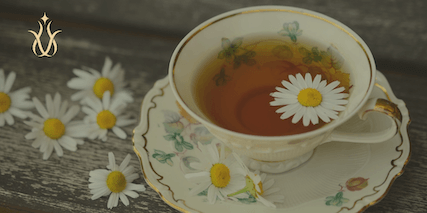What can chamomile tea genuinely do for your health? In this article, we cut through the common claims to examine the true chamomile tea benefits, such as its potential to soothe anxiety, improve sleep quality, and bolster digestive wellness. Dive into concise, evidence-based insights as we lay out the perks and precautions of this popular herbal remedy — all without spoiling the wealth of information to follow or nudging you towards a purchase.
Key Takeaways
-
Chamomile tea is recognized for its calming effects, including stress and anxiety reduction, sleep enhancement, and potential mental health benefits due to its antioxidant content, particularly apigenin.
-
The tea is beneficial for digestive health, offering relief from indigestion, gastritis, and nausea, and it might reduce the risk of further gastrointestinal conditions due to its anti-inflammatory and muscle relaxant properties.
-
It offers immune system support with antiviral and antibacterial properties, and may play a role in preventing colds and the flu, promoting overall health including cardiovascular and women’s health, while also potentially lowering the risk of chronic diseases.

The Calming Effects of Chamomile Tea
The lore of chamomile’s calming powers has been woven into the fabric of natural medicine for centuries. Revered as a panacea for the restless soul, the night’s brew of chamomile tea offers a sanctuary of serenity. Its gentle embrace is attributed to its reputation as a mild sedative known to alleviate conditions such as stress, anxiety, and depression. But what does modern science say? Research nods in agreement, though with a cautious whisper, acknowledging that chamomile tea may indeed ease anxiety and foster better sleep, albeit with findings that invite further exploration.
The secret lies in chamomile’s bouquet of antioxidants. Among them, apigenin stands out, a compound that shields against oxidative stress by keeping the production of free radicals at bay. This is not just about calming the mind; it’s about nurturing the body’s defences against the silent onslaught of stress. With each sip, envision the warmth of the tea as a gentle wave washing over you, bringing tranquillity to your mind and strength to your spirit.
Sleep Enhancement
As dusk falls, a cup of chamomile tea becomes a whispered lullaby, coaxing the restless to repose. It is renowned for its sleep-enhancing virtues, a natural remedy for those who count sheep into the small hours. How can a simple floral brew promise the embrace of Morpheus? The answer lies in the presence of apigenin, an antioxidant that binds to the brain’s receptors, much like a key in a lock, nudging the mind toward the realm of dreams. Coupled with an extract exhibiting hypnotic activity akin to benzodiazepines, chamomile tea is not just folklore; it’s a science-backed nightcap.
Regular indulgence in this nocturnal ritual can transform the night. Drinking chamomile tea can make the journey to slumber smoother and the voyage through the night steadier. While the exact compounds that whisper “sleep” remain shrouded in mystery, the evidence of chamomile’s drowsiness-inducing effect is clear.
So, when the stars climb the sky, let a warm cup of chamomile tea, made from soothing roman chamomile flowers, be your invitation to drink chamomile tea for a peaceful night’s rest.
Anxiety Reduction
In the tempest of modern life, German chamomile tea emerges as a beacon of calm. Its potential to reduce anxiety is a tribute to its mild sedative properties, which offer a respite from stress and create a soothing, aromatic experience. For those navigating the unsteady waters of a generalized anxiety disorder (GAD), chamomile tea may provide modest relief, a gentle nudge towards tranquillity. It is particularly kind to those with mild to moderate symptoms, a natural ally in the quest for inner peace.
What does this mean for you? Research suggests that incorporating chamomile tea into your daily routine could be akin to a therapeutic embrace, one that eases the mind and tempers the storm of anxiety. While it is not a panacea, its anxiolytic effects are a testament to the subtle power of herbal remedies. So, when worry casts its shadows, consider a cup of chamomile tea as a natural remedy, offering solace in every sip.
Stress Relief
Beyond its role as a guardian of the night’s peace, chamomile tea is a harbinger of relaxation. Its historical use for calming anxiety points towards its ability to offer stress relief. Whether it’s the pressures of a deadline or the echo of a hectic day, chamomile tea serves as a liquid tranquillizer, diffusing tension with its herbal embrace. Envision the steam rising from a fresh cup as an aromatic massage for the senses, with each inhalation easing the day’s burdens.
But chamomile’s stress-relieving effects are not merely sensory; they are deeply physiological. This herbal tea, with its mild sedative properties, invites a state of relaxation that supports heart health, soothes stomach troubles, and promotes a holistic sense of well-being. In a world that seldom pauses, a daily ritual of drinking chamomile tea is a simple yet profound act of self-care, a natural remedy woven into the fabric of integrative health.

Chamomile Tea and Digestive Health
Turning from the mind to the body, chamomile tea reveals another facet of its healing prowess—its affinity for digestive health. An upset stomach finds solace in its golden depths, as chamomile tea is known to provide relief from indigestion, gastritis, and nausea, nurturing the gut with gentle care. The herbal world recognizes chamomile tea as a digestif, a soothing end to a meal, and studies suggest it may even reduce the risk of more serious gastrointestinal conditions. The tea’s ability to enhance nutrient absorption by stimulating the production of digestive enzymes positions it as a key player in a healthy digestive system.
Moreover, chamomile’s natural muscle relaxant properties ease tension in the digestive tract, offering a balm for stomach cramps that may arise from nervousness or overindulgence. In this light, drinking chamomile tea is not just a tradition but a strategic choice for those seeking to soothe stomach troubles and support their digestive health. It’s a natural remedy, steeped in the wisdom of herbal medicine, that has withstood the test of time.
Soothing Upset Stomach
When the discomfort of an upset stomach arises, chamomile tea serves as a gentle warrior against inflammation. Its anti-inflammatory and antiphlogistic properties are akin to a soft whisper, calming the inner turmoil that can accompany digestive distress. Interestingly, chamomile has been shown to be about 60% as effective as 0.25% hydrocortisone cream when used in the treatment of eczema, hinting at its potent anti-inflammatory capabilities.
This is not just about easing the occasional discomfort; it’s about embracing an herbal ally that can stand toe-to-toe with traditional medications. When the tides of an upset stomach rise, consider reaching for a cup of chamomile tea. Its ability to reduce inflammation may provide the relief needed to navigate through the day with ease, making it a worthy addition to your repertoire of natural remedies.
Easing Gastrointestinal Disorders
Chamomile tea’s embrace extends beyond soothing an upset stomach; it also offers a helping hand to those grappling with gastrointestinal disorders. Its carminative effect is like a gentle breeze, dispersing the gas that can cause bloating and discomfort. Those who experience the burn of acid reflux may find solace in chamomile tea’s ability to balance stomach acid levels, providing a soothing counterbalance to this fiery condition.
The tea’s anti-inflammatory properties also support the treatment of gastritis, offering a layer of protection against this inflammation of the stomach lining. In fact, chamomile tea may alleviate a range of gastrointestinal disorders, from oesophagal reflux to diverticular disease and other inflammatory diseases. It’s a testament to the power of herbal medicine, where a simple cup can be a source of digestive harmony and integrative health.
Diarrhoea and Colic Relief
Chamomile tea’s gentle nature is especially apparent in its ability to provide gastrointestinal relief for children. It may help alleviate the discomfort and symptoms of diarrhoea, offering a natural remedy for this unsettling condition. In fact, studies have indicated that chamomile extract can prevent diarrhoea, with children treated with chamomile and pectin experiencing a quicker resolution of the condition compared to those given a placebo. This evidence suggests that chamomile tea could be a valuable addition to pediatric care.
Moreover, clinical trials have shown that chamomile tea can significantly reduce colic symptoms in infants, a welcome respite for both the little ones and their parents. With its promising results for gastrointestinal relief in children, including the treatment of diarrhoea and infant colic, chamomile tea stands as a compassionate herbal guardian, offering a gentle touch in times of need.
Boosting Immunity with Chamomile Tea
But chamomile tea’s benefits don’t stop at calming the mind and soothing the gut; it also plays a role in fortifying the body’s defences. With its potential antiviral effects, particularly against strains like the Herpes simplex virus, chamomile tea is a sentinel for immune system health. Its antibacterial properties have shown efficacy against various bacterial strains, further bolstering its reputation as an immune booster. By keeping the immune system in fighting form, chamomile tea helps ward off illness and maintain human health.
The potential health benefits of drinking chamomile tea include:
-
Stimulation of the immune system
-
Protection against germs and viruses
-
Comfort and relaxation
-
Contribution to the body’s resilience in the face of health challenges
Drinking chamomile tea may be akin to donning an invisible shield, one that is both aromatic and imbued with the power of herbal medicine. It’s a natural remedy that not only comforts but also contributes to the body’s resilience in the face of health challenges. As a part of complementary and integrative health practices, dietary chamomile tea offers a holistic approach to well-being, including the use of herbal supplements and herbal teas.
Antioxidant Content
Chamomile tea is a treasure trove of antioxidants, each with its unique role in promoting health. Quercetin, one of these valuable compounds, stands out for its antibacterial, antiviral, and antimicrobial benefits, along with potential anticancer properties. This particular antioxidant also impacts certain enzymes, playing a significant role in modulating the diabetic response and showcasing the tea’s potential for wider health benefits, including its medicinal properties.
With its array of chemical compounds and antioxidants, chamomile tea’s potent anti-inflammatory properties are a cornerstone of its health benefits. These benefits extend beyond the immune system, with the potential to reduce the risk of diseases such as cancer and heart disease, painting a picture of chamomile tea as not just a healthful drink, but a guardian of long-term wellness.
Cold and Flu Prevention
When the chill of cold and flu season sets in, chamomile tea emerges as a comforting companion. Its antibacterial and antiviral properties suggest that it may play a role in preventing infections like the common cold and flu, offering a natural alternative to traditional medicine. Studies have even shown that chamomile can be beneficial in reducing cold symptoms, further supporting its role in preventing and alleviating the misery of these infections.
Moreover, chamomile tea and ginger tea can soothe sore throats and reduce hoarseness, providing symptomatic relief during illness. As natural remedies, they offer a moment of reprieve from the rigours of cold and flu infections, with each cup serving as a warm, healing embrace.
So, when you feel the telltale signs of a cold creeping in, consider brewing a pot of chamomile tea—a simple act that may bolster your body’s defences and comfort you through recovery.

Heart Health and Chamomile Tea
The bounties of chamomile tea extend to the heart, the drumbeat of life. Emerging research suggests that this herbal tea may lower the risk of coronary heart disease and enhance cardiovascular health. Rich in flavonoids, chamomile tea intertwines with heart health, offering a bouquet of benefits for those seeking to nurture their life’s rhythm. These antioxidants, particularly flavones, are associated with the potential to lower blood pressure, a key factor in maintaining a healthy heart.
In this way, drinking chamomile tea can be seen as an act of love for one’s own heart. It is an herbal medicine that not only calms but also cares, supporting the vital functions that keep us thriving. As we explore the specific heart health benefits in the following subsections, consider how a daily cup of chamomile tea could be a simple yet profound addition to your journey toward cardiovascular well-being.
Flavonoids and Heart Health
The heart-protective properties of chamomile tea are largely attributed to its diverse array of flavonoids, such as:
-
Quercetin
-
Apigenin
-
Patuletin
-
Luteolin
These compounds, celebrated for their antioxidant properties, are the unsung heroes in the fight against heart disease. Regular consumption of chamomile tea, brimming with these flavonoids, has been linked to a lower risk of coronary heart disease, especially in elderly men. It’s a compelling reason to consider chamomile tea as part of a heart-healthy lifestyle.
The flavonoids in chamomile tea can be likened to a shield, guarding against the oxidative stress that contributes to heart disease. By including chamomile in one’s diet, one may be taking a proactive step towards cardiovascular health, reaping the potential benefits of these powerful antioxidants. It’s a natural remedy that not only warms the spirit but also supports the heart’s enduring beat.
Blood Pressure Regulation
Managing blood pressure is a cornerstone of heart health, and chamomile tea may play a supporting role. The consumption of this herbal tea has shown a small but significant impact on mean brachial artery pressure in patients with cardiac conditions. This subtle effect highlights chamomile’s potential as a natural aid in regulating blood pressure. However, it’s important to tread carefully for those already on blood pressure medication, as chamomile tea could potentially cause an excessive drop in blood pressure.
This interplay between chamomile tea and blood pressure medication underscores the importance of understanding herbal medicine’s place within overall health management. It’s essential to consult with healthcare providers when integrating chamomile tea into a heart health regimen, especially when other medications are involved. With the right balance, chamomile tea can be a heartwarming addition to a heart-healthy diet, contributing to overall cardiovascular wellness.

Chamomile Tea for Women’s Health
Women’s health, with its unique rhythms and cycles, can also find a friend in chamomile tea. Thanks to its anti-inflammatory, antispasmodic, and sedative properties, chamomile tea may offer relief from the discomfort associated with premenstrual syndrome (PMS) and menstrual cramps. The calming compounds found in chamomile tea, such as Apigenin, work to soothe the nervous system, contributing to the alleviation of PMS symptoms. It’s a gentle yet effective way to reduce anxiety, bloating, and the inflammation and pain associated with this monthly cycle.
In a study with 118 participants, it was found that individuals who took chamomile capsules had milder emotional symptoms of PMS than those who were given a placebo. The results suggest a potential benefit of chamomile in managing PMS symptoms. In addition, a review of seven studies conducted in 2021 discovered that chamomile has the potential to alleviate menstrual pain and reduce bleeding. This highlights the potential benefits of chamomile for managing menstrual discomfort. These findings suggest that chamomile tea can be a comforting companion through the ebbs and flows of women’s health.
Easing PMS Symptoms
When PMS casts its shadow, chamomile tea can be a beacon of relief. Its benefits include:
-
Anti-inflammatory properties that specifically target pain by inhibiting the COX enzyme, offering a natural intervention for the discomfort that often accompanies PMS.
-
Chamomile has been found to be as effective as Mefenamic Acid, a common anti-inflammatory drug, in relieving PMS-related pain.
-
Chamomile aids in the regulation of emotions during this time, providing a holistic approach to PMS symptom relief.
For those seeking a natural remedy for the myriad symptoms of PMS, drinking chamomile tea may be a soothing solution. Its ability to manage pain and emotional fluctuations is a testament to the power of herbal medicine in supporting women’s health. So, when PMS looms, consider chamomile tea as a gentle yet potent ally.
Relieving Menstrual Cramps
The monthly ordeal of menstrual cramps finds solace in the soothing embrace of chamomile tea. Its antispasmodic properties offer relief by calming muscle spasms that contribute to menstrual pain. The comforting warmth of a cup of chamomile tea can help to ease not only the physical discomfort but also the anxiety and tension that often accompany period pain.
The holistic nature of chamomile tea’s relief is what sets it apart from other remedies. It’s not just about easing cramps; it’s about nurturing a sense of calm during a time that can be fraught with discomfort. Drinking chamomile tea can be a ritual of self-care, a natural way to honour one’s body and provide tender support during the menstrual cycle.
Potential Side Effects and Precautions
While chamomile tea has many benefits, it’s important to consider potential side effects and precautions. Though generally safe, chamomile tea may cause allergic reactions in individuals sensitive to ragweed and other members of the Compositae family. It can also interact with various medications, including:
-
blood thinners
-
sedatives
-
anti-seizure medications
-
drugs affecting blood sugar levels or metabolized by the liver
These interactions can potentially intensify the effects of these medications. Therefore, it’s crucial to be aware of these interactions and to consult healthcare professionals before incorporating chamomile tea into your regimen, particularly if you are taking medication or have underlying health conditions.
In addition to allergic reactions, some individuals may experience side effects such as:
-
eye irritation
-
hypersensitivity reactions
-
vomiting
-
in rare cases, the exacerbation of asthma symptoms
To reduce the risk of bleeding, it is recommended to discontinue chamomile use at least two weeks before surgery or dental procedures.
While chamomile tea is widely recognized as safe for most people, certain groups, including pregnant women and individuals with conditions like IBS, may need to limit intake or avoid it altogether.
Allergic Reactions
While uncommon, allergic reactions to chamomile tea are a potential risk to be mindful of. Those with allergies to plants in the same family, such as asters, daisies, chrysanthemums, or ragweed, might also react to chamomile. If you have a known allergy to these plants, it’s wise to proceed cautiously or avoid chamomile altogether. Symptoms of an allergic reaction can range from mild to severe, and in the event of any adverse response, medical attention should be sought. Some common symptoms of an allergic reaction to chamomile include:
-
Skin rash or hives
-
Itching or swelling of the face, lips, or tongue
-
Difficulty breathing or wheezing
-
Nausea or vomiting
-
Dizziness or fainting
If you experience any of these symptoms after consuming chamomile tea, it is important to seek medical attention immediately.
The immune system’s response to allergens is highly individual, and what may be a source of comfort for one person could trigger an allergic reaction in another. Listening to your body and recognising any signs of discomfort that may develop after consuming chamomile tea is essential. By doing so, you can enjoy the health benefits of chamomile without compromising your well-being.
Pregnancy Concerns
The safety of consuming chamomile tea is a topic of particular concern for expectant mothers. Due to potential risks, pregnant women are advised to avoid chamomile tea, as it may increase the risk of miscarriage. The safety of drinking chamomile tea has not been fully established for pregnant or nursing women, and caution is advised. Given the delicate balance required during pregnancy, it is best to consult with a healthcare provider before including chamomile tea in your diet.
Navigating the seas of pregnancy involves making informed choices about what to consume, and chamomile tea falls into a grey area where more research is needed to determine its safety. Until then, the precautionary principle suggests erring on the side of caution and exploring other safe and healthy teas that can provide comfort during pregnancy. By doing so, expectant mothers can ensure the well-being of both themselves and their developing child.
Summary
Throughout this exploration of chamomile tea, we’ve uncovered a tapestry of benefits that extend from the serene shores of stress relief to the robust defences of immune health and onward to the nurturing embrace of women’s wellness. Chamomile tea, with its floral notes and golden warmth, is more than a beverage—it’s a testament to the healing power of nature. By incorporating this herbal tea into our daily lives, we harness the potential to enhance our sleep, soothe our stomachs, bolster our hearts, and support our overall health.
Let this humble herb inspire you to cultivate a life of balance and well-being. Whether you seek calm amid chaos, relief from physical discomfort, or a natural boost to your immunity, chamomile tea can be a trusted companion on your journey to wellness. So, as we conclude this exploration, may you be inspired to pour yourself a cup of this liquid tranquillity and sip your way to a healthier, happier you.
Frequently Asked Questions
Can chamomile tea help with anxiety?
Yes, chamomile tea can provide modest relief for anxiety, especially for those with mild to moderate generalized anxiety disorder (GAD). It has mild sedative properties that may help ease anxiety symptoms.
Is chamomile tea good for sleep?
Yes, chamomile tea is good for sleep because the antioxidant apigenin in chamomile binds to brain receptors that promote drowsiness and improve sleep quality.
Can I drink chamomile tea for digestive issues?
Yes, chamomile tea can be beneficial for digestive issues such as upset stomach, acid reflux, gastritis, and diarrhoea, providing soothing relief, particularly for children.
Does chamomile tea have any benefits for the heart?
Yes, chamomile tea has potential benefits for the heart. It contains flavonoids that may lower the risk of coronary heart disease, improve cardiovascular health, and regulate blood pressure.
Are there any side effects to drinking chamomile tea?
Yes, chamomile tea is generally safe, but it can cause allergic reactions and interact with some medications, so pregnant women are advised to avoid it.
What are the active compounds in chamomile tea?
The active compounds in chamomile tea that contribute to its benefits include several phenolic compounds, primarily the flavonoids apigenin, quercetin, patuletin, luteolin, and their glucosides. Additionally, the essential oil extracted from chamomile flowers contains terpenoids such as alpha-bisabolol and its oxides and azulenes, including chamazulene.
What is the mechanism of action of these active compounds in chamomile tea?
The flavonoids in chamomile tea, such as apigenin, quercetin, patuletin, and luteolin, along with their glucosides, exert their effects through various mechanisms. Apigenin and its glucosides have been shown to modulate carbohydrate digestion and absorption by inhibiting α-amylase and maltase activities, which could attenuate postprandial hyperglycemia.
These compounds also inhibit glucose and sucrose transport in Caco-2/TC7 cell monolayers, suggesting an interaction with the GLUT2 transporter, which may be involved in their antidiabetic effects.
The terpenoids, including alpha-bisabolol and its oxides, as well as azulenes like chamazulene, contribute to chamomile’s pharmacological actions. Alpha-bisabolol has been found to induce slow, concentration-dependent relaxations in isolated blood vessels, which is not blocked by inhibition of nitric oxide synthase or potassium channels, indicating a mechanism mediated through inhibition of calcium influx.
Chamazulene and bisabolol also exhibit antioxidant activity, with bisabolol being one of the most effective antioxidants in chamomile.
These compounds, through their various actions, contribute to the therapeutic potential of chamomile, including anti-inflammatory, antioxidant, and antispasmodic effects. However, it is important to note that while these mechanisms have been observed in vitro and in animal models, clinical evidence in humans is still needed to fully understand the implications of these findings for the treatment of specific health conditions.
Disclaimer: This article is for informational purposes only and should not replace professional medical advice. If you have specific concerns or medical conditions, it is recommended to consult with a healthcare professional for personalised guidance and support.
Resources
A Review of the Bioactivity and Potential Health Benefits of Chamomile Tea (Matricaria Recutita L.).
McKay DL, Blumberg JB.
Phytotherapy Research : PTR. 2006;20(7):519-30.
Chang SM, Chen CH.
Journal of Advanced Nursing. 2016;72(2):306-15.
Chamomile Consumption and Mortality: A Prospective Study of Mexican Origin Older Adults.
Howrey BT, Peek MK, McKee JM, et al.
The Gerontologist. 2016;56(6):1146-1152.
Kato A, Minoshima Y, Yamamoto J, et al.
Journal of Agricultural and Food Chemistry. 2008;56(17):8206-11.
Hieu TH, Dibas M, Surya Dila KA, et al.
Phytotherapy Research : PTR. 2019;33(6):1604-1615.
Scientifically Proven Benefits of Meditation for Stress Relief






